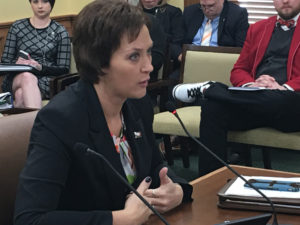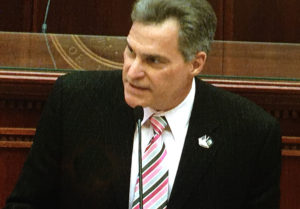 By Steve Brawner
By Steve Brawner
© 2017 by Steve Brawner Communications, Inc.
“All politics is local,” the late U.S. Speaker of the House Tip O’Neill used to say, but that’s no longer the case. Now, all politics is national.
That’s according to Dr. Alan Abramowitz, an Emory University political science professor who spoke at the Clinton School of Public Service Thursday.
Abramowtiz said straight ticket voting, where voters choose candidates from the same party in all races, reached its highest level in 2012 in the 60 years that it’s been studied, and preliminary research shows 2016 no doubt followed that trend. That’s increasingly true whether voters are strong partisans, weak partisans, or independents who lean toward one party or the other. Most of those last folks are just “closet partisans” who won’t admit to themselves or to others that they are really a Republican or Democrat.
Abramowitz said this trend is being fueled by two causes: the increasing influence of presidential elections on down-ballot races, and the rise of “negative partisanship.” That’s where Americans are increasingly voting in partisan ways not because they like their party more but because they dislike the other party so much.
It wasn’t long ago that states and districts commonly selected one party’s candidate for president and the other party’s candidates in some of the congressional and other major races. The most famous example in Arkansas occurred in 1968, when voters pulled the lever for independent presidential candidate George Wallace, Democratic Sen. William Fulbright, and Republican Gov. Winthrop Rockefeller. Even as Democrats dominated Arkansas politics until 2010, the state was voting for the Republican in every presidential election starting in 1980 except for 1992 and 1996, when a native son was on the ballot.
Back then, Arkansas Democrats could differentiate themselves from the national party even if they were more liberal than their constituents by restraining their impulses and emphasizing their independence.
Now, it’s all about the party and the presidential candidate. Asked by American National Election Studies to rate parties on a temperature scale with 100 being hottest and 0 being coldest, since 1978 Americans have consistently rated their own party around 70 degrees. However, the opposing party had dropped from just below 50 degrees to 30 degrees by 2012. Fifty-eight percent of Democrats rated President Trump at zero, and 56 percent of Republicans gave Hillary Clinton the same score. Sen. Mark Pryor’s incumbency and last name netted him all of 39 percent against Sen. Tom Cotton in 2014, when Pryor was one of four Democratic incumbent senators to lose in states that had voted for Republican Mitt Romney two years earlier. In 2016, all 34 Senate races were won by the candidate whose presidential candidate won the state. In fact, the only two incumbent senators who lost were Republicans in states won by Clinton. Of the 435 U.S. House seats, 400 were won by the candidate whose party’s presidential candidate won their district.
The old tools – incumbency, principled leadership, dedicated constituent service, even bringing home the bacon – simply don’t cut it any more. Pity the Democratic state legislators in Arkansas who try to buck the trend by explaining to 30,000 (in the House) and 86,000 (in the Senate) constituents why they’re still Democrats but different than Nancy Pelosi. That’s why Democrats in this state are either losing, not running for re-election, or switching parties, as three state legislators did following the November elections.
In hindsight, Gov. Mike Beebe’s 64-36 re-election in 2010 against a decent Republican opponent, and subsequent high poll numbers throughout the rest of his term, remain one of the most impressive political achievements of recent years. Of course, he didn’t have to run in 2014, as Pryor did.
Abramowitz did not offer much hope for Arkansas Democrats, or for the declining numbers of us truly independent voters, or for people who just don’t like partisan politics. We’re now trapped in a cycle. Politics in Washington, D.C., is becoming increasingly confrontational, which fuels voter disgust mostly with the other party, which encourages even more confrontational behavior in Washington, D.C.
So for the foreseeable future, all politics, or at least most of it, will be national. I wonder what Tip O’Neill, the dealmaker, would have to say about that. I wonder if he even would have been elected.


